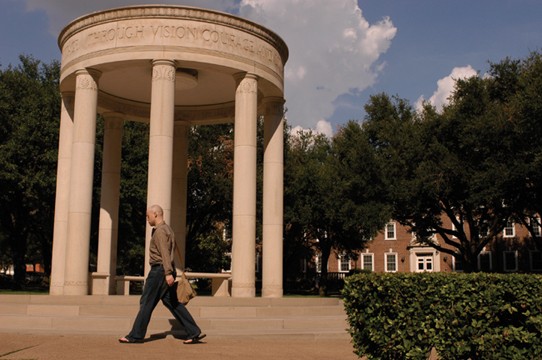
Evening law school receives high interest
Since the Dedman School of Law announced it would be offeringevening classes so that working people can pursue their goals for anew future without giving up their day jobs last spring, theresponse to the program has been tremendous.
“I have a family to support and a full-time job,”said Joel Martinez, an information technologies expert. “I amfascinated by our country’s laws and how they impact ourdaily lives. This is the opportunity to enter a new career fieldthat I find interesting while providing for my family.”
Martinez is one of the hundreds who attended an informationalmeeting held at the law school. Others attending werecorporate finance executives, social workers, nurses, teachers,engineers and a hospital CEO.
In preparation for the change to the law programs, two meetingsprovided information on the program to the community. Advertisementfor the meetings was word of mouth only. On a meeting on the schoolcampus on June 1, more than of 400 people attended. At a latermeeting, more than 300 attended.
“We have a dedicated group of people here who are lookingto the future needs of the community with this program,” LynnBozalis of Law Admissions said. “There are currently threeday programs. This will be changed to two daytime programs and oneevening program. After surveying the community and industry, thisseems to be what the people want.”
A recent market study conducted by the law school showed thedemand for an evening program in the Dallas area is strong. Thestudy received more than 1,700 responses in two weeks; 71 percentof the qualified respondents said they definitely or probably wouldapply for admission.
Most of the people who responded to the market study arecurrently in professional fields, 43 percent of the respondents hadmaster’s degrees and 6 percent had doctorates. The mostfrequently cited careers were in human resources, financialservices and health care. Other occupations listed were engineers,information technology specialists and paralegals.
“There’s a lot of talent out there that is not beingtapped because people have obligations for the care of theirfamilies but cannot get away for day classes,” Bozalis said.”This is not driven by economic need, we had a 48 percentincrease in applications for the law school last year. The nationalrate increased 20 percent. We’re doing this because of thegrowing number of or so of age who find that they want or need tofind a new career. There are brilliant people out there who wouldbe an asset to the law community but just can’t getaway.”
Beginning in the fall of 2004, SMU’s Dedman School of Lawwill begin offering evening law programs.
Students enrolled in the evening program must complete the same90 hours as day students. The program will take approximately fouryears to complete. Students in the evening program will take thesame required courses as the day program. In addition, the eveningprogram students will be offered a wide array of electives in taxand commercial law, intellectual property and corporate law. It isestimated that classes will begin at about 5:30 p.m. and run untilapproximately 9:30 p.m.
To accommodate both programs, the law school will decreaseenrollment in the day program from approximately 250 students to175 students. The school anticipates that the evening program willenroll 80 to 90 students each year.
“The university and the law school are to be commended forreassessing how to offer legal education beyond the traditionalmodel. There are not many schools that would be so adaptable tochange,” said Michael Boone, an SMU trustee and foundingpartner with the firm Haynes & Boone L.L.P.








